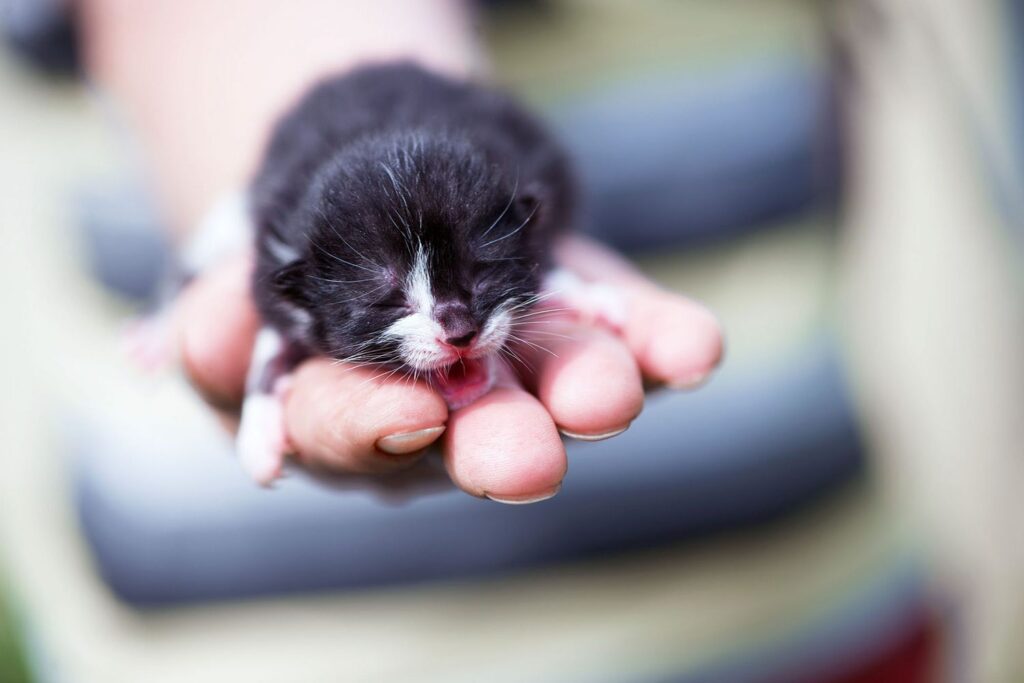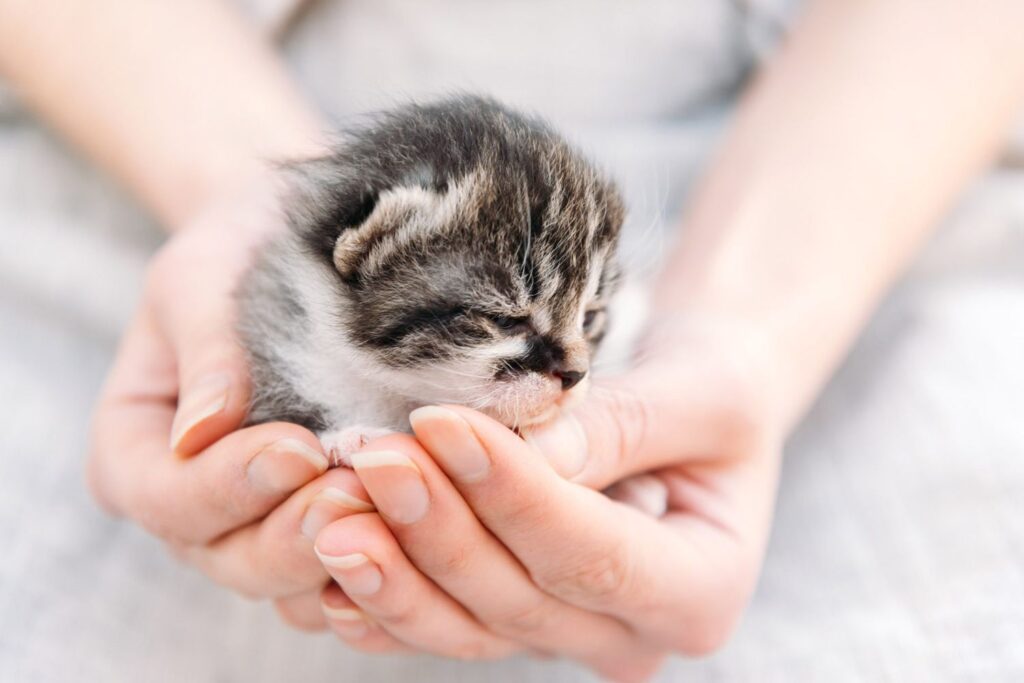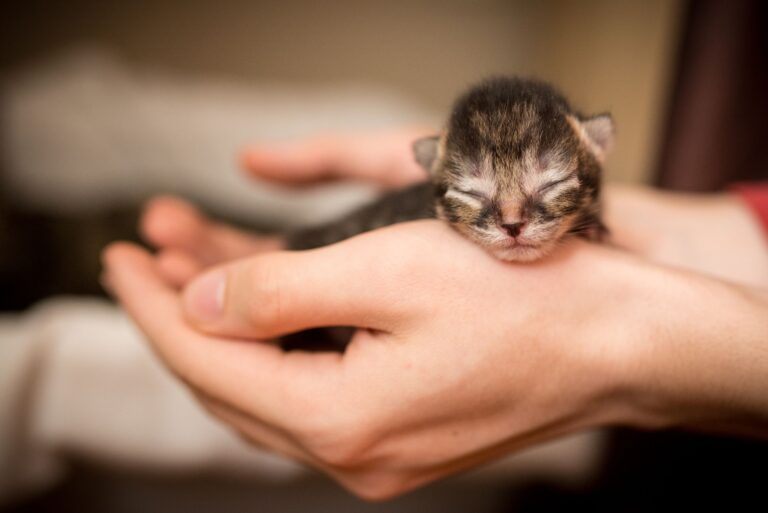No, Kittens usually don’t have fleas when they’re born, but they can get them from their mom during birth or from their surroundings. Keep an eye on newborn kittens for flea signs, like tiny black dots on their fur.
Moreover, if you think they have fleas, talk to the vet. Fleas can make kittens sick, so it’s important to get rid of them. The vet can suggest safe ways to control fleas for kittens. Keep the environment clean, groom the kittens, and treat other pets for fleas to stop infestations.
Here, you will find the solution to get rid of fleas as well as prevent tips.
Quick facts about fleas

Cat fleas are common and not picky eaters – they’ll happily snack on dogs and humans too.
Fleas can’t fly, but they can jump super high, like a person jumping over a really tall building!
Fleas are bloodsuckers and, in the past, spread some not-so-great diseases.
So, if you find them on newborn kittens, it means there are fleas in the house or on their mom. Fleas can hide from the vacuum cleaner, and they can wait for a chance to jump onto a new host.
Remember, even if your other pets seem fine, they might still be hanging around. And, oh boy, female fleas can start laying eggs after their first blood meal. Yikes! Just a heads-up, don’t let them ruin your lunch.
Banishing Fleas and Ticks from Your Kitten: Definitive Steps
Step 1: Mastering the Flea Battle
- Deploy the Flea Comb:
- Opt for a flea comb, the safest method for removing fleas. Obtain one from your local pet store.
- Conduct the combing in a warm room to prevent your kitten from catching a chill, which could be perilous.
- Create a flea-drowning solution by adding a few drops of liquid detergent to warm water. Comb the fleas off, placing them in the water and ensuring their demise.
- Water, Oil, and Combat:
- Dilute bath oil with water (5 parts water to 1 part oil) and apply it to the kitten’s coat using a sponge or spray.
- Deploy the flea comb on the damp coat, as fleas tend to flee to drier areas.
- Capture the evasive fleas and drop them into a water bowl for their final plunge.
- Alternatively, immobilize fleas on double-sided tape for controlled disposal.
- Extend Care to Other Feline Residents:
- If other cats or kittens share your space, including the mother cat, ensure they also undergo flea treatment. Prevent the transfer of fleas between animals.
Step 2: Vet Consultation for Flea Medications
- Navigate Medication Safely:
- Engage your veterinarian in a discussion about suitable flea medications.
- Acknowledge the potential danger of most flea medications to kittens, emphasizing manual removal for newborns.
- Consider Capstar for kittens over four weeks, targeting adult fleas while sparing their offspring.
- Confirm with your vet before administering any flea medications to prevent harm to your kitten.
- Steer Clear of Natural Oils:
- Discourage the use of natural oils, such as lavender, eucalyptus, and geranium, for flea removal, as they can be toxic to young kittens.
Step 3: Tackling the Tick Challenge
- Fine-Tuned Tick Removal:
- Employ fine-tipped tweezers, gloves, and insecticide or rubbing alcohol for tick removal.
- Securely hold your kitten and use tweezers near the tick’s head, pulling instead of twisting to avoid bacterial contamination.
- Drop the extracted tick into a jar of insecticide or rubbing alcohol for termination.
- Post-removal, apply antiseptic to tick bites, ensuring daily treatment for cleanliness.
- Vet Consultation on Tick Prevention:
- Engage your vet in a conversation about tick prevention medications for your kitten.
- Be cautious as certain tick prevention products can pose health issues in kittens.
- Extend tick prevention treatment to other cats or kittens in your home to prevent cross-contamination.
Eliminating Fleas and Ticks from Your Living Space: A Definitive Plan
Step 1: Grasping the Necessity
- Recognize the Significance:
- Comprehend the critical need to eradicate fleas and ticks from your home when your kitten is afflicted.
- Understand that these pests don’t solely inhabit your cat’s fur; a significant portion resides in bedding, fabrics, and surfaces your kitten has encountered during the infestation.
- Recognize that about five percent of adult fleas live on your cat, while the majority exist as pupae, larvae, and eggs within your home’s surfaces.
- Realize the potential for persistent flea and tick outbreaks leading to infection or illness for your kitten if the living environment is not thoroughly cleaned.
Step 2: Wrangling Bedding and Fabrics
- Corral All Bedding and Fabrics:
- Assemble all bedding and fabric items in your home, utilizing garbage bags for containment.
- Execute a thorough washing of the bedding on the hottest setting to exterminate pests and their offspring.
Step 3: Vacuuming with Precision
- Execute a Comprehensive Vacuuming:
- Conduct an extensive vacuuming of all surfaces in your home, focusing on corners, concealed areas, and spots where fleas or ticks might lurk.
- Ensure thorough vacuuming of furniture, curtains, and shelving surfaces.
- Enhance your vacuum’s efficiency by placing a flea collar in the vacuum cleaner bag, facilitating the collection of fleas.
- Post-vacuum, meticulously clean and dispose of the bag, preventing any escaped fleas.
Step 4: Employing Professional Pest Control
- Utilize Specialized Pest Control Measures:
- Invest in a professional pest control product, often in the form of an aerosol “flea bomb,” for a rigorous home cleaning to prevent re-infestation.
- Evacuate your home, including pets, before activating the flea bomb, recognizing its toxicity to other animals.
- Alternatively, enlist a professional pest controller to apply a pet-safe spray across your home and garden, ensuring comprehensive flea and tick eradication.
Keeping Your Kitten Safe from Fleas and Ticks: Easy Steps
Step 1: Keep Your Kitten Inside
- Safe Indoor Play:
- Make sure your kitten stays indoors to avoid ticks and fleas from playing outside.
- If she does go out, check her carefully for fleas or ticks and remove them right away.
- As your kitten grows up, think about using sprays or treatments to prevent ticks and fleas.
Step 2: Vacuum Your Home Every Week
- Weekly Cleaning Routine:
- Vacuum your home every week to keep it clean and get rid of hiding spots for fleas and ticks.
- Vacuum regularly, especially if your kitten goes outside or if you have other pets at home.
- Check your carpets, furniture, and storage areas each week for ticks or fleas, and get rid of them as soon as you find any.
Step 3: Take Care of Your Garden
- Garden Watch:
- Keep your garden or yard free from ticks by cutting tall grass and trimming bushes.
- Use pet-safe bug spray in your garden to make sure there are no fleas or ticks.
- Keep your outdoor space safe for your kitten by taking good care of your garden.
Extra Tip: Pregnancy and Fleas
Starting Fresh for New Kittens:
- Make sure the mother cat is free of fleas to protect newborn kittens.
- Check with your vet if it’s okay to use spot-on treatments for pregnant cats.
- Treat all your pets for fleas to prevent any problems.
Home Care Tips:
- Treat your home carefully, one room at a time, and keep your pets away during the process.
- Look for different sprays in the store, and ask your vet for advice on what will work best.
Is It Common For Kittens To Have Fleas?
No, It’s rare for kittens to start with fleas – they usually pick them up from other animals or places. If you notice tiny black dots (flea dirt) on your kitten’s fur, it’s time to check for fleas.
For the right help, talk to your vet if you suspect fleas. Treating them in kittens is different, and some medicines aren’t safe for them. Fleas can make kittens sick, causing problems like anemia, itchy skin, and slow growth. So, seeing the vet is crucial.
To stop fleas, try to keep your kitten indoors. If they go outside, keep an eye on them. Regularly check for fleas and use preventatives. These simple steps keep your kitten healthy and flea-free.
Is It Bad If Newborn Kittens Have Fleas?

Yes, it’s not good if baby kittens have fleas. They can be really bad for them because their immune systems are still growing, making them more likely to get sick from flea-related diseases. If not taken care of, fleas could even lead to serious problems or death for the little kittens.
In addition, they don’t come into the world with fleas; they pick them up after they’re born. There are a few ways this can happen, like hanging out with other animals that have fleas. Even mama cats can give fleas to their babies while cleaning them.
Fleas aren’t just bothersome; they can spread diseases to tiny kittens, like typhus fever, plague, cat scratch disease, and tularemia. So, it’s not just about being annoyed by fleas; they can actually be dangerous for little kittens, causing problems like anemia and even putting their lives at risk.
That’s why it’s super important to make sure your kitten is safe from fleas. Talk to your vet for advice on how to prevent and treat fleas. It’s a big deal, especially when they’re still little and nursing.
FAQ’s
Do newborn kittens get fleas?
Yes, newborn kittens can get fleas, and fleas can be deadly to them. It is important to bathe the kittens when fleas or flea dirt are observed, especially since over-the-counter and prescribed flea treatments are not suitable for use on neonatal kittens.
Do kittens naturally get fleas?
Yes, kittens can naturally get fleas. Fleas may jump from one pet’s fur to another, and kittens can acquire fleas from their mother cat during nursing or breastfeeding. Fleas often lay their eggs on other pet animals, and some may fall off and hatch in the home environment.
Is it normal for a kitten to have fleas?
Yes, it is normal for kittens to have fleas. All cats, regardless of age, can get fleas. It is essential to treat kittens for fleas with an appropriate product. Even if keeping the kitten indoors until neutered, it’s advisable to treat them for fleas.
Are kittens likely to get fleas?
Yes, kittens are likely to get fleas, especially if they come into contact with other cats and animals. Fleas can also be acquired from bedding, carpets, or soft furnishings where an infected pet has shed flea eggs. Flea eggs can remain dormant in the home for almost a year.
What kills fleas on newborn kittens?
A gentle bath with dish soap is a method to kill fleas in newborn kittens. This helps eliminate live fleas and wash away larvae and flea dirt. However, caution should be exercised during the bathing process to avoid causing trauma to the kitten.
Can I bathe a newborn kitten?
Yes, you can bathe a newborn kitten. It’s recommended to use a gentle approach to avoid chilling the kitten during the bath. Care should be taken to ensure the bathing process is done correctly to prevent any distress to the kitten.
What kills flea eggs?
Mopping and steam cleaning can help kill flea eggs. Washing linens, bedding, and pet beds in the washing machine on a hot cycle is advisable. Decluttering the home can also make it easier to clean and reduce the places where flea eggs can hide.
Can fleas live in human hair?
Yes, While fleas can jump onto humans and may be found in human hair temporarily, they won’t stay and live there. Human hair isn’t thick enough to provide long-term shelter for fleas, and most flea species don’t feed on humans. If a flea jumps onto a person from a pet, it will likely leave in search of better shelter.
Conclusion
Kittens are not typically born with fleas. The myth surrounding newborn kittens and fleas likely stems from misconceptions or observations of fleas on the mother cat or in the household.
Furthermore, they can be acquired by kittens shortly after birth, primarily from their environment, the mother cat, or other pets in close proximity. It is crucial for pet owners to remain vigilant, promptly address any signs of fleas, and consult with a veterinarian for appropriate preventive measures and treatments.
By maintaining a clean living environment, practicing regular grooming, and ensuring the well-being of all pets, one can effectively minimize the risk of them infesting newborn kittens.

